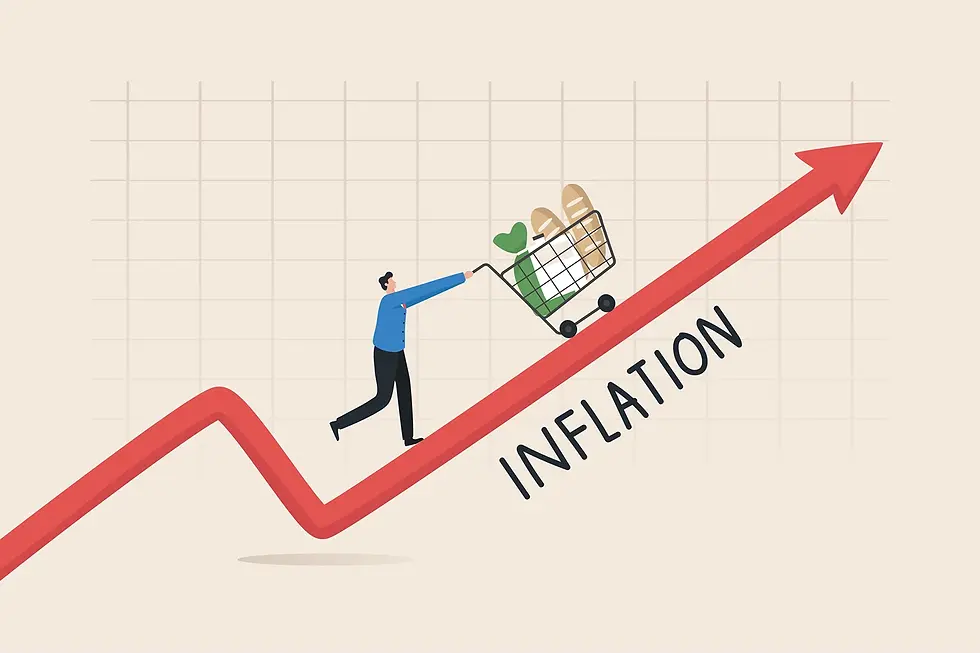How Inflation Affects Your Retirement
- raiblerealtyinvest
- Oct 4, 2023
- 3 min read
Retirement planning is a long-term financial journey, and it requires careful consideration of various factors that can impact your nest egg over time. One such factor that often flies under the radar but can significantly affect your retirement savings is inflation. In this blog post, we'll explore the various components of inflation and how they can impact your retirement in Pittsburgh. We'll also delve into strategies for investing to mitigate the effects of inflation and help you achieve a financially secure retirement.
What Is Inflation?
Inflation refers to the general increase in prices of goods and services over time. When inflation occurs, each unit of currency buys fewer goods and services than before. This means that over the years, your money's purchasing power diminishes, making it essential to understand how inflation can affect your retirement plans in Pittsburgh.

The Components of Inflation
Demand-Pull Inflation: This occurs when there is an increase in consumer demand for goods and services, leading to higher prices. Factors like increased consumer spending, government spending, or even economic growth can drive demand-pull inflation.
Cost-Push Inflation: Cost-push inflation arises from an increase in production costs, often caused by factors such as rising wages, higher raw material costs, or disruptions in the supply chain. These increased costs are typically passed on to consumers, resulting in higher prices.
Built-In Inflation: Sometimes referred to as wage-price inflation, this type of inflation occurs when businesses and workers expect prices to rise in the future. As a result, workers demand higher wages, and businesses increase their prices preemptively, creating a self-fulfilling prophecy of inflation.
Monetary Policy: Central banks, like the Federal Reserve in the United States, can influence inflation through their monetary policy. By adjusting interest rates, controlling money supply, or implementing other measures, they can either stimulate or curb inflation.

The Impact of Inflation on Retirement in Pittsburgh
So, how does inflation affect your retirement? Here are some key ways:
Eroding Purchasing Power: As mentioned earlier, inflation reduces the purchasing power of your money. This means that the same amount of money you save today will buy less in the future. For retirees, this can lead to a diminished quality of life if their fixed retirement income does not keep pace with rising costs.
Longevity Risk: People are living longer, and longer life expectancy increases the time over which your savings need to last. Inflation can erode your savings more quickly if you live longer, putting additional pressure on your retirement funds.
Investing Strategies to Combat Inflation
How to protect retirement savings from the erosive effects of inflation? Consider these investment strategies:
Diversification: Diversifying your investment portfolio across various asset classes like stocks, bonds, real estate, and commodities can help spread risk. Stocks, for instance, have historically outpaced inflation over the long term.
TIPS (Treasury Inflation-Protected Securities): These government bonds adjust their principal value with inflation. TIPS provide a guaranteed return above the rate of inflation, making them a valuable asset for retirees.
Stocks: Historically, stocks have provided a hedge against inflation. Companies can often increase prices, which can translate to higher profits and, in turn, higher stock prices. However, stocks also come with higher volatility.
Real Assets: Investing in real assets like real estate and commodities can be a good inflation hedge. Real assets tend to appreciate with inflation, protecting your purchasing power.
Dividend-Paying Stocks: Dividend-paying stocks can provide a source of income that keeps pace with or outpaces inflation. Companies that consistently raise their dividends can be particularly attractive.
Regular Portfolio Rebalancing: Regularly review and rebalance your portfolio to ensure it aligns with your retirement goals and risk tolerance. Adjust your investments as needed to account for changing economic conditions.
Inflation is a hidden threat to your retirement savings, but with careful financial planning and the right investment strategies, you can mitigate its impact. Understanding the various components of inflation and incorporating inflation-fighting investment strategies into your retirement plan in Pittsburgh can help you maintain your purchasing power and enjoy a financially secure retirement. Remember, it's never too early to start planning for your retirement and protecting your hard-earned savings from the erosive effects of inflation.




Comments